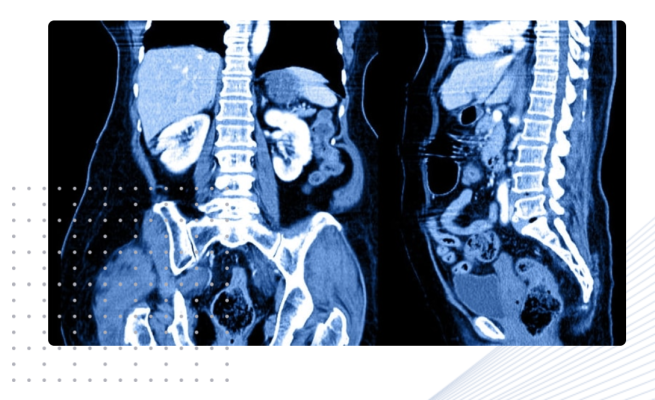
April 29, 2022 — Nano-X Imaging LTD, an innovative medical imaging technology company, today announced that its deep-learning medical imaging analytics subsidiary, Nanox.AI, received FDA 510(k) clearance for HealthOST device, an AI software that provides qualitative and quantitative analysis of the spine from CT to support clinicians in the evaluation and assessment of musculoskeletal disease. Measurements of vertebral fractures and low bone density have been shown to increase the identification of patients with musculoskeletal disease of the spine, such as osteoporosis, a disease that affects more than 10 million people in the U.S.1
This is Nanox.AI’s tenth FDA clearance across its innovative portfolio of AI clinical decision assist tools and second FDA clearance for its vertebral compression fracture device. HealthOST offers a more detailed evaluation, including the ability to measure fractures more precisely, potentially aiding clinicians in evaluating risk factors for osteoporosis. The company’s latest AI solution automatically identifies findings suggestive of compression fractures and low bone density, enabling further work up and treatment of patients diagnosed with osteoporosis to prevent potentially life-changing major osteoporotic fractures, such as a hip fracture. Nanox.AI previously received FDA clearance in May 2020 for the AI software that identifies vertebral compression fractures.
“With the FDA clearance of HealthOST, we are thrilled to offer radiologists a new tool that provides deeper analysis of medical images to support identifying those patients who may be at-risk of developing prevalent musculoskeletal conditions such as osteoporosis, to help promote further work up and treatment of those patients,” said Pini Ben Elazar, General Manager of Nanox.AI. “Our new product reflects our vision to create solutions to improve population health, building upon our strong track record of developing AI applications to help identify risk factors for chronic health conditions.”
According to the World Congress of Osteoporosis, 75% of compression fractures are missed or not reported. According to the CDC, approximately 10.2 million adults in the U.S. have osteoporosis while 43.3 million more have low bone density.1 Evidence suggests that there is a 25% mortality rate reported within one year of a patient sustaining a hip fracture.2
“This FDA clearance is yet another step in our commitment to delivering technologies that promote population health and value-based care,” said Erez Meltzer, Chief Executive Officer of Nanox. “AI technologies like HealthOST are poised to support routine clinical decision making and potentially improve patients’ health outcomes.”
HealthOST provides qualitative and quantitative analysis of the spine, including labeling of T1-L4 vertebrae, measurement of height loss in each vertebra (T1-L4) and measurement of the mean Hounsfield Units (HU) in volume of interest within vertebra (T11-L4). HealthOST is indicated for use in patients aged 50 and over undergoing CT scan for any clinical indication that includes at least four vertebrae in the T1-L4 portion of the spine (for vertebral height loss) and T11-L4 (for bone attenuation) portions of the spine.
Nanox.AI’s portfolio also includes HealthCCSng, an FDA-cleared AI cardiac imaging solution that quantifies coronary artery calcium (CAC), to identify patients potentially at risk for a cardiovascular event, to promote further work up and possible treatment for cardiac disease.
For more information: www.nanox.vision/ai
References:
1 Osteoporosis or Low Bone Mass in Older Adults: United States, 2017–2018. Centers for Disease Control and Prevention. Updated March 31, 2021. Accessed April 26, 2022. https://www.cdc.gov/nchs/products/databriefs/db405.htm
2 Schnell S, Friedman SM, Mendelson DA, Bingham KW, Kates SL. The 1-year mortality of patients treated in a hip fracture program for elders. Geriatr Orthop Surg Rehabil. 2010;1(1):6-14. doi:10.1177/2151458510378105


 September 15, 2025
September 15, 2025 









